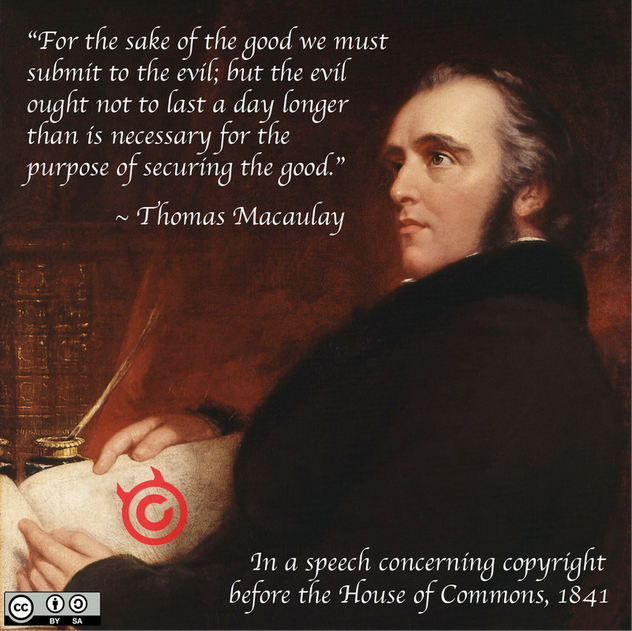|
In the modern day, I have heard many arguments about copyright; however, some of the best arguments I have heard come from Thomas Jefferson (1813) and Thomas Babington Macaulay (1841). I have reproduced them below, along with a graphic of Macaulay that summarizes my thoughts on the matter. The Jeffersonian Warning, from a letter to Isaac McPherson, 1813 If nature has made any one thing less susceptible than all others of exclusive property, it is the action of the thinking power called an idea, which an individual may exclusively possess as he keeps it to himself; but the moment it is divulged, it forces itself into the possession of every one, and the receiver cannot dispossess himself of it. Its peculiar character, too, is that no one possess the less, because every other possess the whole of it. He who receives an idea from me, receives instruction himself without lessening mine; as he who lights his taper at mine, receives light without darkening me. That ideas should freely spread from one to another over the globe, for the moral and mutual instruction of man, and improvement of his condition, seems to have been peculiarly and benevolently designed by nature, when she made them, like fire, expansible over all space, without lessening their density in any point, and like the air in which we breathe, move, and have our physical being, incapable of confinement or exclusive appropriation. Inventions then cannot, in nature, be a subject of property. Society may give an exclusive right to the profits arising from [inventions], as an encouragement to men to pursue ideas which may produce utility, but this may or may not be done, according to the will and convenience of the society, without claim or complaint from any body. Accordingly, it is a fact, as far as I am informed, that England was, until we copied her, the only country on earth which ever, by a general law, gave a legal right to the exclusive use of an idea. In some other countries it is sometimes done, in a great case, and by a special and personal act, but, generally speaking, other nations have thought that these monopolies produce more embarrassment than advantage to society; and it may be observed that the nations which refuse monopolies of invention, are as fruitful as England in new and useful devices. Thomas Babington Macaulay, on copyright before the House of Commons, 1841 We must betake ourselves to copyright, be the inconveniences of copyright what they may. Those inconveniences, in truth, are neither few nor small. Copyright is monopoly, and produces all the effects which the general voice of mankind attributes to monopoly … I believe, Sir, that I may safely take it for granted that the effect of monopoly generally is to make articles scarce, to make them dear, and to make them bad. And I may with equal safety challenge my honorable friend to find out any distinction between copyright and other privileges of the same kind; any reason why a monopoly of books should produce an effect directly the reverse of that which was produced by the East India Company’s monopoly of tea, or by Lord Essex’s monopoly of sweet wines. Thus, then, stands the case. It is good that authors should be remunerated; and the least exceptionable way of remunerating them is by a monopoly. Yet monopoly is an evil. For the sake of the good we must submit to the evil; but the evil ought not to last a day longer than is necessary for the purpose of securing the good. I understand the necessity of copyright for protecting the creative works of authors, designers, etc. Yet, authors no longer benefit from such protection after their death, much less 70-95 years after their death. Current copyright extends much beyond a “day longer than is necessary.”
0 Comments
Your comment will be posted after it is approved.
Leave a Reply. |
About
This blog presents thoughts that Cecil has concerning current projects, as well as musings that he wants to get out for future projects. For questions or comments on his posts, please go to his Contact page. Archives
April 2024
Tags
All
|

 RSS Feed
RSS Feed
